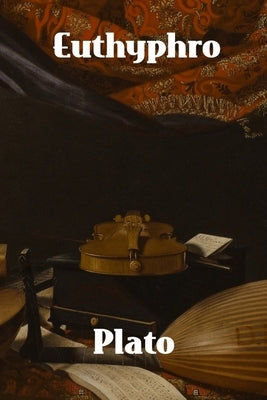Before you leave...
Take 20% off your first order
20% off
Enter the code below at checkout to get 20% off your first order
Discover summer reading lists for all ages & interests!
Find Your Next Read

Euthyphro by Plato, is a Socratic dialogue whose events occur in the weeks before the trial of Socrates (399 BC), between Socrates and Euthyphro. The dialogue covers subjects such as the meaning of piety and justice. As is common with Plato's earliest dialogues, it ends in aporia.
In this dialogue, Socrates meets Euthyphro at the porch of the archon basileus (the 'king magistrate') at that time. Socrates tells him that he is preparing to go to court against the charges of Meletus on the grounds of impiety. Euthyphro tells Socrates that he is going to court himself to prosecute his father for binding a worker in chains and leaving him to die. This has granted him the ire of his own family who believe his father was in the right. The worker had killed a fellow worker, which they believe exempts his father from liability for leaving him bound in the ditch to starve to death. Since Euthyphro seems assured of himself, Socrates asks him to define piety. His help will clarify Socrates' case in the courtroom. If Socrates is asked to define piety, he can simply rely on Euthyphro's definition. This however leads to the main dilemma of the dialogue when the two cannot come to a satisfactory conclusion. Is something pious because the gods approve of it or do the gods approve of it because it is pious? This aporic ending has led to one of the longest theological and meta-ethical debates in history.
The dialogue in Euthyphro occurs near the court of the archon basileus (king magistrate), where Socrates and Euthyphro encounter each other; each man is present at the court for the preliminary hearings to possible trials.
Euthyphro has come to present charges of murder against his own father who, after arresting one of his workers (Thetes) for killing a slave from the family estate on Naxos Island, tied him and threw him in a ditch where he died of exposure to the elements (3e-4d) while Euthyphro's father waited to hear from the exegetes (cf. Laws 759d) about how to proceed. Socrates is astonished by Euthyphro's confidence in being able to prosecute his own father for the serious charge of manslaughter, despite the fact that Athenian Law allows only relatives of the dead man to file suit for murder (Dem. 43 57). Euthyphro dismisses the astonishment of Socrates, which confirms his overconfidence in his own critical judgment of religious and ethical matters
Thanks for subscribing!
This email has been registered!
Take 20% off your first order
Enter the code below at checkout to get 20% off your first order